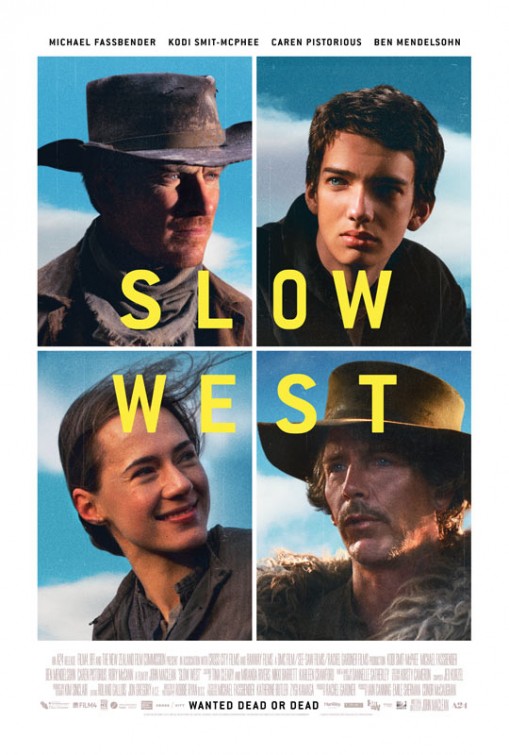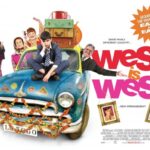Wanted Dead Or Dead
Director
John Maclean
Starring
Kodi Smit-McPhee
Michael Fassbender
Caren Pistorius
Ben Mendelsohn
Slow West stands out to me for bucking the revisionist western trend and being a story driven by unrequited love, rather than revenge. The whole thing is presented as a collection of fables experienced by an optimist and a realist – much in the vein of Don Quixote. Set in the late nineteenth century, young Scot, Jay Cavendish [Smit-McPhee], has travelled from his native land to the wilderness of the United States. Almost immediately he is set upon by the locals but is saved by roguish outlaw Silas Selleck [Fassbender], who persuades Cavendish to pay him for protection on his travels. The pair are abrasive to one another but owing to the harsh environment and trigger-happy locals, end up forming a simple mutual bond. As they continue on their journey, we learn that Cavendish is seeking out an old flame (Rose Ross played by Caren Pistorius) while Silas’ motivation isn’t entirely clear, even to himself. Add a vicious, fur-coat decked bounty hunter by the name of Payne [Mendelsohn] to the mix and matters soon complicate themselves further.
With its minimalist dialogue and simple plot, extreme care and attention has been taken for the film’s visual and aural presentation. Filmed in New Zealand – which doubles amazingly for the American west – everything is shot with a beautiful brutalism; the sun bears down mercilessly, the wind howls, rivers overflow and every night’s sleep is perforated by a layer of pinecones. The cinematography is frankly beautiful, offering a mixture of simple vignettes, split-focus shots and long drawn out stationary wide shots of the rolling landscapes. While the score is perfectly fitting, it’s the wonderful audio work which seems to stand out by far. While camping one evening, Silas and Jay hear cracking twigs in the darkness and Silas takes his rifle to investigate. While he does, the shot lingers on Jay as he clutches at his pistol and stares into the dark woods. We don’t know what’s happening and while the scene isn’t designed to scare audiences, it generates a great deal of unease and tension before Silas returns, nonchalantly explaining the local wildlife were attracted to Jay’s carelessly discarded leftover dinner. Simple work but mightily impressive.
Serving as John Maclean’s feature directorial debut, Slow West is a fondly written love letter to the genre. It would be quite easy to claim that this film’s lack of realism when it comes to things like pain and death (wounds never get infected, single bullets seem to kill instantly – unless you’re a key character and sourcing food presents few issues) play a major negative and fly in the face of everything westerns represent. But it could just as easily be claimed that this creates a fairy tale dream of the West. I think it depends entirely on where you’re from and your preferences with this genre. Americans have grown up in the evolved land of the Wild West, they’ve seen how westward expansion turned out and subsequently experience it with an either apologist or romanticised vision. Europeans, on the other hand, are descendants of those who didn’t emigrate to the new world, many of whom saw America as a land of brigands, cut-throat thieves and opportunists – some still do. So which version do you prefer? The traditionalist, the revisionist or the pessimist? Critically speaking, the film holds up with the latter two but for fans of established mining towns, gun-slinging duels between white/black hats and Indian braves raiding circled wagons, it’s a bit of a miss.
**Spoiler paragraph**
I find it very hard to fault this film as it is the embodiment of my kind of movie. However, the ending irked me just a little. As the story progresses, we witness Silas’ human side emerging and it becomes evident that he will probably end up changing his scurrilous nomadic ways. Furthermore, the reveal of the Ross homestead implies that young Rose has moved on from her previous ties and any connection with Jay was a platonic one. All of which formulaically implies that Jay has to die. I don’t necessarily have a problem with this, like Quixote the character is too great a dreamer for this harsh world and while he has no place in it, he seems to touch the lives of those around him. There’s even a dream sequence which foreshadows how the film will end but it’s played out as a nightmare rather than a charming omen, so when it eventually comes to pass, I was a tad put out.
Admittedly, there’s nothing especially new about Slow West, every trope and cliché is present executed by clear caricatures. If you’ve seen a handful of westerns you could not only predict where the film is heading but pretty much every step of the character’s journey. There’s also a lot of very obvious imagery which plays heavily on the hindsight and retrospect of how America tuned out but personally I think all of this works in the film’s favour, rather than detrimentally. A good comparison would be 2003’s Open Range and 2011’s Rango. Both films play up to every stereotype and development in the genre yet both turned out to be really solid, commendable features. Far from perfect but beautifully shot, wistfully written, lovingly crafted, memorably acted and clichéd as hell. And Slow West is no different.
Release Date:
26th June 2015
The Scene To Look Out For:
**Coming back to that spoiler from earlier**
Earlier I mentioned the obvious imagery utilised throughout. I also mentioned the ending of the film, what I left out was the fact that the person to kill the idealistic Jay Cavendish is his beloved Rose Ross, mistaking him for an intruder. While many films would play this out immediately, Slow West opts to keep Rose’s focus on the battle at hand, before realising that the shot and dying waif is in fact her childhood friend. However my personal highlight takes place before she realises he’s there. The unarmed Jay is shot clear in the chest and collapses against the wall, he lies there powerless, watching the woman he loves share a tender moment with a local Native American before he braves the battle. As he watches on helplessly, a renegade bullet shatters a jar of salt, which covers him entirely, burning into his wounded heart. It’s a very on-the-nose metaphor but one that’s still surprisingly rewarding – in a cruel schadenfreude kinda way.
Notable Characters:
Without rhyme or reason and beyond all logic, I rather liked the character of Werner. Having ‘escaped’ Silas’ company, Jay comes across a polite and friendly German who is cataloguing the decline of the Native Americans. The two share a brief conversation and coffee before sleeping on the plains. In the morning Jay awakes to find his belongings, clothes and horse gone. I don’t know why Werner amused me. It could have been because he screwed over Jay, in spite of being a good man. Or that his good man act was literally an act to lower Jay’s guard; which if you consider the fact that the kid is a bit feeble and Werner was armed is a slightly redundant move. There’s no way to understand the character’s motive but that’s possibly why I found him interesting.
Highlighted Quote:
“Quite the pair, a falling angel and a rising devil”
In A Few Words:
“Simple small scale release which manages to cover most, if not all, of the standard tropes of the genre. No new ground trodden here but the trek is certainly worthwhile”
Total Score: 4/5
![The Red Right Hand Movie Reviews [Matthew Stogdon]](https://reviews.theredrighthand.co.uk/wp-content/uploads/2021/12/cropped-header1.png)




